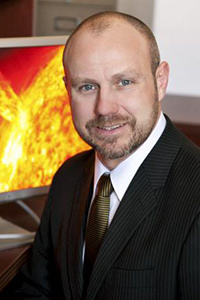
Gregory Howes, an associate professor in the Department of Physics and Astronomy at the University of Iowa, is the winner of the inaugural 2016 Ronald C. Davidson Award for Plasma Physics. The award recognizes outstanding plasma physics research by a Physics of Plasmas author.
The award will be presented annually in collaboration with the American Physical Society (APS) Division of Plasma Physics.
Howes’ research was selected from a short list of the most impactful papers, representing all topical focus areas in Physics of Plasmas during the past five years. His paper, “A Weakened Cascade Model for Turbulence in Astrophysical Plasmas,” Physics of Plasmas, was co-authored with Jason TenBarge and William Dorland at the University of Maryland. Howes and his collaborators were the first group to run supercomputer simulations of the kinetic turbulence in solar wind.
Howes predicted what the turbulent energy spectrum should look like at the small scale where electrons dissipate the turbulence. However, his simulations did not reconcile with his prediction, and he assumed there was an error in the simulation. A year later, spacecraft measurements of the turbulence in the solar wind were published, experimentally validating the simulation model.
“I thought long and hard about what must be happening, and that led me to the weakened cascade model,” Howes says. “The missing element was that one cannot assume that turbulent interactions are strictly local—when turbulence is being dissipated, nonlocal interactions play an increasingly important role, and that effect explained both the simulations and observations.”
The award, which includes a cash prize of $5,000, will be presented Nov. 2 during the APS Division of Plasma Physics Banquet and Reception.
“We at AIP Publishing and Physics of Plasmas are delighted to announce Gregory Howes as the recipient of the Inaugural Ron Davidson Award,” says Jason Wilde, chief publishing officer at AIP Publishing.
Howes was recognized in 2010 by President Barack Obama as one of 94 researchers who received the Presidential Early Career Award for Scientists and Engineers, the highest honor bestowed by the U.S. government to science and engineering professionals in the early stages of their independent research careers.